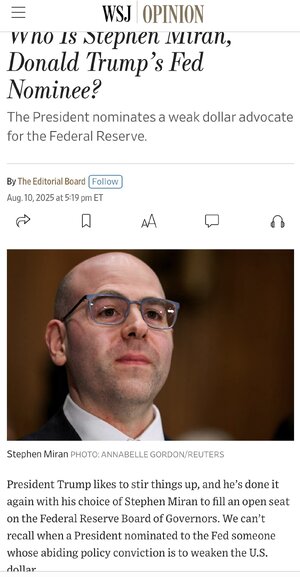

. —>
https://www.wsj.com/opinion/who-is-...4?st=VhPKZr&reflink=desktopwebshare_permalink
“… [Miran] summed up his central argument in a widely cited November 2024 essay:
“From a trade perspective, the dollar is persistently overvalued, in large part because dollar assets function as the world’s reserve currency.” Foreign central banks hold huge dollar reserves and most of the world’s goods are traded in dollars. He says this global demand for dollars results in an overvalued greenback that leads to trade imbalances and harms Americans.
His solution? Manage a decline in the dollar’s value over time by reducing the global demand for the U.S. currency, or at least mitigate the effects of its overvaluation. Tariffs do the latter in his view by forcing foreigners to pay for the fact that their currencies are undervalued and boost their exports to the U.S.
But his ambition goes beyond tariffs. In that 2024 essay he laid out other policy options for negotiating a weaker dollar and diminishing its reserve-currency status.
One idea is to tax foreigners who hold U.S. Treasury debt as an incentive to hold less of it. This would amount to a de facto default on current debt.
More ambitiously, Mr. Miran floats a “Mar-a-Lago Accord” in which leading nations would negotiate a new global financial system to rebalance currency values. This echoes the Plaza and Louvre accords of the 1980s that coordinated monetary policies to arrest the surging dollar amid the rush of capital and goods into the U.S. during the Reagan economic boom….”


